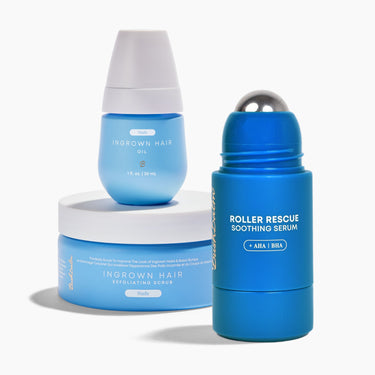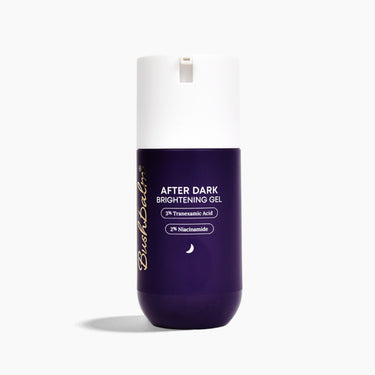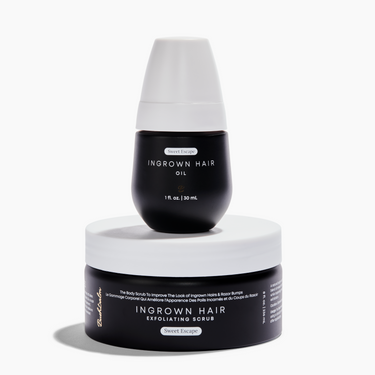Table of Contents
- How to reduce pubic hair itch when you shave
- How to reduce pubic hair itch when trimming
- Growing out your pubic hair
- What else you can do for itchy pubic hair
- Issues with trimming your pubic hair with scissors
- Optimal pubic hair length to prevent itching
- The difference between itchy pubic hair and an ingrown hair
A few reasons why your pubic hair itches after you trim it and how you can fix it!
Table of Contents
- How to reduce pubic hair itch when you shave
- How to reduce pubic hair itch when trimming
- Growing out your pubic hair
- What else you can do for itchy pubic hair
- Issues with trimming your pubic hair with scissors
- Optimal pubic hair length to prevent itching
- The difference between itchy pubic hair and an ingrown hair

- Shave
- Trim
- Grow
Why does my pubic hair itch?
Itchy pubic hair could be due to a variety of reasons. The most common causes are hair removal, specially shaving, and hair regrowth, which causes ingrown hairs and razor burn.
If you are experiencing itch symptoms after shaving you are most likely going to benefit from moisturizing with an ingrown hair & razor burn oil. If you are suffering from recurring ingrown hairs, leading to pubic itch you'll want to focus on exfoliating prior to your next shave.
Below we will go through why you get itchy pubic hair and how you can avoid it in the future.
#1 - How to reduce pubic hair itch when you shave it
Note: Shaving is the hardest on your pubic region and most likely to cause redness and irritation.
There are a few ways you can combat the harsh consequences of shaving. The first two are very simple, but highly effective.
Suggestion 1: Shave in the shower under hot/warm water
By shaving in shower under hot or warm water, you quickly soften the hair. This makes the razor cut through the hair much easier, thus, reducing irritation.
Suggestion 2: Use a Soothing Pubic Oil or natural oils immediately after shaving
Using a natural product (ideally containing Jojoba Oil) will help soothe your skin after shaving. It's important to get oils that are extremely soft on the skin. At Bushbalm, we use Jojoba Oil and Tea Tree Oil, which help soften the skin and prevent ingrown hairs.
Which direction to shave pubic hair?

Shave your pubic hair in the direction of hair growth to reduce the amount of irritation. At times shaving with the hair growth will lead to less hair being removed, so you'll likely have to take a long time.

#2 How to reduce pubic itch when you trim
Note: I'm biased, as I personally trim and find it the most effective way to handle your pubic hair.
By trimming your pubic hair, you get the benefits of having a natural barrier, but you also get the benefit of relief. When you allow your hair to grow, you eliminate the redness and irritation caused by shaving. However, when growing your pubic hair, it's common to ignore what is under the hair. In the dry seasons, many people get dry skin and ignore it leading to itch in the pubic region after trimming. For this, I'd recommend using a baby oil, or even pubic hair oil when you get out of the shower. This will help moisturize the skin and hair on a regular basis to prevent itching.
What causes itchy pubic hair after trimming?
There are several reasons why your pubic region region itches after you trim, but it's likely due to the sensitive skin around the pubic region. This discomfort and itch is often causes by a 'shock to the system'. If you've grown your pubic hair and trimmed very low it can lead to skin flairing up, leading to a rash. To prevent this you should always moisturize and exfoliate your pubic region regularly.
According to Medical News Today, "using shaving products that contain artificial scents and harsh chemicals, such as alcohol, can irritate the skin and contribute to itchiness."
#3 Growing out your pubic hair and what it really means
In our beauty society, we often miss the benefits of the natural look. However, it's not all bad to grow out your pubic hair. You get the natural health benefits of additional protection, but you need to be mindful of the risks. By growing your hair, you can occasional maintain more scent. This was originally meant for sexual connection/lure, but forgotten in todays world.
To combat it, as well as dry skin, you can always focus on the pubic as much as a man would focus on their beard. It's extremely common to see a dry "straw like" beard on a man, but it's not entirely ideal. For this, you can use various natural oils. At Bushbalm, we use Jojoba Oil, Tea Tree Oil, Grapeseed Oil, and various essential oils to help your pubic hair stay soft, prevent ingrown hairs, and make you smell delightful.

About Pubic Hair
“It provides a cushion against friction that can cause skin abrasion and injury; protection from bacteria and other unwanted pathogens, and is the visible result that long-awaited adolescence hormones have kicked in.”
Common Questions
What should you do after trimming pubic hair?
To reduce the chance of itchy pubic hair we recommend applying a soothing pubic hair oil, as this will soften the hair follicles. By using the oil daily your hair and skin will be softer and more reception to hair removal. After trimming it's also recommended to exfoliate down there, as this will help remove dead skin cells. The main goal after you trim is to ensure the hairs grow back appropriately and you avoid razor burn and ingrown hairs.
What else can I do for my itchy pubes?
If you want to get ahead of the itch, we'd recommend following the steps in our How to Dry Brush blog post. This will help you prevent the itchiness and soothe your pubic region.
Can trimming pubic hair with scissors cause itching
Depending on the itch you are experience this could be true. The pubic region has some of the most sensitive skin on the body making it receptive to irritation making metal from scissors a potentially irritating material. To prevent this we recommend using a soothing pubic hair oil and a gental pubic hair trimmer.
If the itch persists seek medical advice.
What length should I trim my pubic hair to prevent itch?
Trimming your pubic hair too low is a common way to get itch during regrowth. We recommend using a guard to have your pubic hair remain at least 2mm high. This will lead to less itching when it grows back, as the hairs won't be going through the skin.
Why do my pubes itch after trimming?
The most common cause for itchy pubic hair is trimming with a dull blade or making contact with your skin. To prevent this focus on exfoliating your skin and hair, so it is less sensitive.
What is an ingrown hair vs. itchiness?
According to Mayo Clinic, "an ingrown hair occurs when a shaved or tweezed hair grows back into the skin. It can cause inflammation, pain and tiny bumps in the area where the hair was removed." It's common you'll see post-shaving irritation turn into ingrown hairs, which thereafter turns into itchiness in the pubic region. To prevent this you'll want to focus on an exfoliation and moisturizing routine for your pubic region.





















